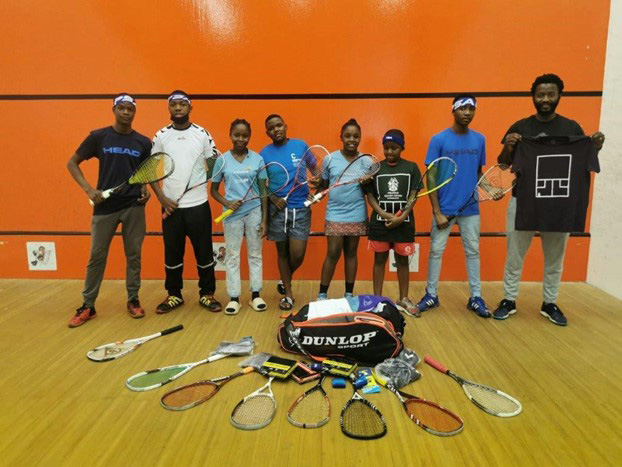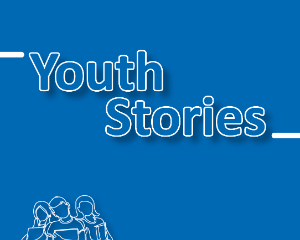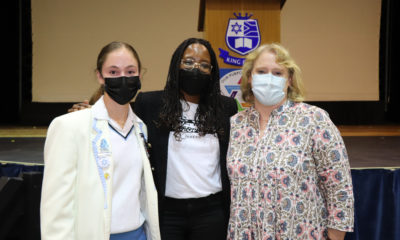
Sport

Squash gives power to inner-city kids
It may seem strange to read about squash saving lives, but that’s exactly what Egoli Youth Empowerment is doing for children from disadvantaged backgrounds. At the same time, their enthusiasm for squash has literally saved the game in South Africa.
“We’re empowering people so they can empower others,” says Lesley Cowan, Egoli’s girls programme director. More than 3 000 youngsters are involved in the programme, which started as a squash programme and is now an empowerment programme. It’s the biggest squash development programme in Africa and the only one in the inner city of Johannesburg. The youngsters come from the inner city, Alexandra, and Soweto.
Before joining Egoli, the youngsters had never heard of squash. The programme has squash courts at the University of Johannesburg Doornfontein Campus, where it runs sessions on Wednesdays and Thursdays. In addition to sessions there and in Parkview on Saturdays, Egoli enters the kids in squash tournaments.
The idea came about in 2009, when squash-lover and engineer Glenn Lazarus wanted to give back to society. He met Dikana Mthombeni, a first-league squash player, in Soweto and they decided to run some informal sessions there.
They spoke at schools, inviting kids to come to the courts. About 300 kids arrived and there were only three coaches. “The programme blossomed from there,” says Lazarus, the director and founder of Egoli. “It evolved from being about sports to being about life skills, building great citizens, making sure we have kids going to school, promoting sport as a healthy lifestyle, and making sure they are better people and ultimately achieve in life.”
Egoli reinvented itself during the COVID-19 pandemic by becoming an outreach programme which handed out weekly food parcels to hundreds of kids in the inner city. It spent R245 000 on food in the first seven months of the pandemic.
“Because of COVID-19, we started branching out into a lot more areas,” says Cowan, a tax consultant and a provincial squash player herself. “One of the areas is street racket, which is a game that can be played anywhere, at any time, on any surface, with any bat and a soft ball, and it can incorporate lots of people.”
The kids in the programme play street racket in a way that allows them to learn subconsciously. As Lazarus explains it, “You might be hitting the ball to a person and calling out cities of the world. So, I hit the ball to you, and I say ‘Johannesburg’, and then you say ‘Tel Aviv’, and so on.”
In addition to painting street racket courts around the Standard Bank Arena in Bertrams in the inner city, the programme also established offices across the road from the Johannesburg Cricket Club in the middle of Bertrams. “It’s a fantastic cricket field,” says Cowan. “Now, we’re in association with it. They teach our kids cricket, and we teach their kids squash.”
With the easing of restrictions, Egoli has resumed its squash programme.
The programme aims to use the Ellis Park Sport Precinct, which boasts rugby, tennis, cricket, swimming, and athletics facilities. “We’re hoping to introduce padel [paddle tennis] as one of the games as well,” says Lazarus.
Mthombeni’s rise to coaching squash juniors and seniors at the 2017 Maccabi Games is one of the programme’s success stories. “It was like going to the Olympics,” he says. “One of the highlights of my coaching career. Two of our players got gold medals.”
Besides Mthombeni, the programme has produced some of the top 20 squash players in South Africa, and players have represented the country in championships across the globe.
“Many of our kids get bursaries to top schools and universities,” says Cowan. “We sent kids on a carpentry course and sponsored six of them to go on a six-week computer course. One of our kids became an optometrist, another a teacher, another is in his final year of LLB.”
The latter is Request Sinyandiwo, who has been involved with Egoli since 2011 – first as a kid in the programme and now as a coach. “The programme stands for change, not just changing the community but changing how society views certain aspects of life,” he says. “We’re mostly focused on getting kids off the street. I’m a testament to that.
“Kids in the inner city don’t get a lot of opportunities,” says Mthombeni. “A number of them turn to drugs or crime, or they’re sexually abused. With Egoli, we’re trying to create a safe space, where they can come every day, have a meal, do their homework, and play squash.”
Clinton Ndebele, one of the coaches who came through the programme, is a full-time teacher who helps educate the kids. “We do learning activities, verbal, and writing activities,” he says.
“We have an amazing group of coaches who have come through the programme,” says Mthombeni. “We’re rewriting the coaching manual. Usually, you have one coach for two or three kids. You never hear of 40 kids per coach. Every session ends with yoga, and there’s complete silence, which shows how dedicated the kids are.”
Lazarus, who played squash at the Maccabi Games, says, “Squash took a huge dive in South Africa during the early 2000s relative to other sports, and a lot of kids started to focus on technological games. But we have probably brought in excess of 8 000 kids into the game.”
“Previously all the squash players were white and from Christian schools,” says Cowan. “Now at a tournament, you will see 60% Egoli players.
“We’re not a charity. We’re raising funds to uplift. The kids get nothing without doing something. They give back all the time. We want to uplift these kids so they can make money themselves.”
- If you want to learn more about the programme, contact Lesley Cowan on 083 232 0758.










